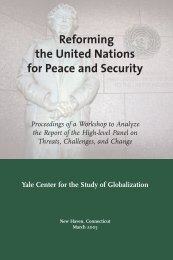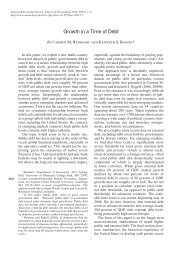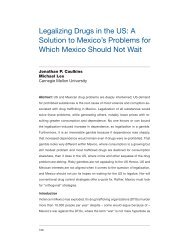The collapse of global trade, murky protectionism, and the crisis:
The collapse of global trade, murky protectionism, and the crisis:
The collapse of global trade, murky protectionism, and the crisis:
You also want an ePaper? Increase the reach of your titles
YUMPU automatically turns print PDFs into web optimized ePapers that Google loves.
7. Protectionism <strong>and</strong> <strong>the</strong> <strong>crisis</strong><br />
Anne Krueger<br />
Johns Hopkins University, former Deputy Managing<br />
Director, IMF<br />
Since 1945, <strong>the</strong> world economy has experienced unprecedented growth. That growth<br />
was fuelled in significant part by <strong>the</strong> great liberalization <strong>of</strong> <strong>trade</strong> in goods <strong>and</strong> services,<br />
<strong>and</strong> by capital flows. Virtually all analysts <strong>and</strong> economic historians regard <strong>the</strong><br />
reduction <strong>of</strong> policy <strong>trade</strong> barriers (tariffs, quantitative restrictions on <strong>trade</strong>, <strong>and</strong> o<strong>the</strong>r<br />
impediments to <strong>trade</strong>) <strong>and</strong> <strong>of</strong> transport <strong>and</strong> communications costs as having been<br />
essential in spurring growth. Countries such as Korea, China <strong>and</strong> India have been<br />
able to make huge gains in living st<strong>and</strong>ards <strong>and</strong> <strong>the</strong> economic well being <strong>of</strong> <strong>the</strong>ir peoples<br />
relying in significant part on <strong>the</strong> international market. And <strong>the</strong> industrial countries<br />
<strong>the</strong>mselves have sharply reduced <strong>trade</strong> barriers. While <strong>the</strong>re is still some protection,<br />
in most countries it is quantitatively smaller <strong>and</strong> significantly less protective<br />
than 60 years ago.<br />
<strong>The</strong> <strong>crisis</strong> has naturally raised concerns in many countries about present <strong>and</strong><br />
potential losses in employment <strong>and</strong> incomes. One <strong>of</strong> <strong>the</strong> responses has been to call<br />
for protection, or direct support, <strong>of</strong> domestic industries. As underst<strong>and</strong>able as <strong>the</strong>se<br />
calls are, responding to <strong>the</strong>m would not increase employment <strong>and</strong> incomes, <strong>and</strong>,<br />
<strong>global</strong>ly would reduce it. Worse yet, additional protection now would undercut<br />
progress made to date <strong>and</strong> seriously threaten to diminish, if not destroy, growth<br />
prospects going forward.<br />
If one or more systemically important countries increase protection – <strong>of</strong> <strong>the</strong> traditional<br />
tariff-<strong>and</strong>-quota variety, <strong>of</strong> targeted support for individual industries, <strong>of</strong> programs<br />
encouraging or requiring purchases <strong>of</strong> domestically produced goods, or o<strong>the</strong>r<br />
industry-specific measures – in response to <strong>the</strong> <strong>crisis</strong>, o<strong>the</strong>r countries will find political<br />
pressures to do <strong>the</strong> same thing irresistible <strong>and</strong> will retaliate.<br />
Even without taking into account <strong>the</strong> protectionist reactions on <strong>the</strong> part <strong>of</strong> o<strong>the</strong>r<br />
countries, however, <strong>the</strong> protection-imposing country or countries would gain very little,<br />
if anything, <strong>and</strong> that only for a very short time. <strong>The</strong> protectionist measures would<br />
have reduced <strong>the</strong> exports <strong>of</strong> o<strong>the</strong>r countries, thus reducing <strong>the</strong>ir incomes <strong>and</strong> <strong>the</strong>ir<br />
imports. To <strong>the</strong> extent that <strong>the</strong>ir imports did not fall sufficiently to <strong>of</strong>fset <strong>the</strong>ir own<br />
reduced receipts, <strong>the</strong> exchange rate would adjust. <strong>The</strong> result would be reduced<br />
dem<strong>and</strong> for imports from <strong>the</strong> systemic country. At best, <strong>the</strong>n, <strong>the</strong> result <strong>of</strong> increased<br />
protection would be reduced employment in export industries which would <strong>of</strong>fset<br />
any increase in employment in <strong>the</strong> protected, import-competing industry.<br />
Meanwhile, import-competing goods would have higher prices which would reduce<br />
domestic consumption.<br />
But with protectionist responses, which would almost surely follow, <strong>the</strong> result<br />
would be even worse. Incomes would fall in <strong>the</strong> affected countries whose exports<br />
were confronting increased protection, but in addition, <strong>the</strong>ir retaliation would reduce<br />
export dem<strong>and</strong> in <strong>the</strong> systemically important country or countries. One result would<br />
be higher prices <strong>of</strong> import-competing goods in both countries, reducing <strong>the</strong> quanti-<br />
37





